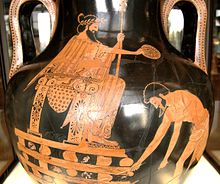Croesus
In 2019, D. Sasseville and K. Euler published a research of Lydian coins apparently minted during his rule, where the name of the ruler was rendered as Qλdãns.
[8][9] Under his father's reign, Croesus had been a governor of Adramyttium, which Alyattes had rebuilt as a centre of operations for military actions against the Cimmerians, a nomadic people from the Pontic steppe who had invaded Western Asia, and attacked Lydia over the course of several invasions during which they killed Alyattes's great-grandfather Gyges, and possibly his grandfather Ardys and his father Sadyattes.
Once Ephesus was under Lydian rule, Croesus provided patronage for the reconstruction of the Temple of Artemis, to which he offered a large number of marble columns as dedication to the goddess.
[8] Thus, according to Herodotus, Croesus ruled over all the peoples to the west of the Halys River - the Lydians, Phrygians, Mysians, Mariandyni, Chalybes, Paphlagonians, Thyni and Bithyni Thracians, Carians, Ionians, Dorians, Aeolians, and Pamphylians.
Both Croesus and Amasis had common interests in fostering trade relations at Naucratis with the Greeks, including with the Milesians who were under Lydian authority.
[1] Croesus also established trade and diplomatic relations with the Neo-Babylonian Empire of Nabonidus, which ensured the transition of Lydian products towards Babylonian markets.
[1] Croesus also continued the good relations between Lydia and the sanctuary of the god Apollo in Delphi on continental Greece first established by his great-great-grandfather Gyges and maintained by his father Alyattes, and just like his ancestors, Croesus offered the sanctuary rich presents in dedication, including a lion made of gold and weighing ten talents.
In exchange for the offerings of Croesus to the sanctuary of Apollo, the Lydians obtained precedence in consulting its oracle, were exempt from taxes, were allowed to sit at the first rank, and were granted the permission to become Delphian priests.
These exchanges of gifts for privileges in turn meant that strong relations of hospitality existed between Lydia and Delphi due to which the Delphians had the duty to welcome, protect, and ensure the well-being of Lydian ambassadors.
Thereafter, he obtained immortality... by Omphale he had Agelaus, from whom the family of Croesus was descended...[21]Moreover, the first coins were quite crude and made of electrum, a naturally occurring pale yellow alloy of gold and silver.
The composition of these first coins was similar to alluvial deposits found in the silt of the Pactolus river (made famous by Midas), which ran through the Lydian capital, Sardis.
[26] Croesus, secure in his own wealth and happiness, asked Solon who the happiest man in the world was, and was disappointed by Solon's response that three had been happier than Croesus: Tellus, who died fighting for his country, and the brothers Kleobis and Biton who died peacefully in their sleep after their mother prayed for their perfect happiness because they had demonstrated filial piety by drawing her to a festival in an oxcart themselves.
Sure enough, Croesus' hubristic happiness was reversed by the tragic deaths of his accidentally killed son and, according to Ctesias, his wife's suicide at the fall of Sardis, not to mention his defeat at the hands of the Persians.
Thus, the "happiness" of Croesus is presented as a moralistic exemplum of the fickleness of Tyche, a theme that gathered strength from the fourth century, revealing its late date.
[1] In a likely legendary event recounted by Herodotus, Croesus responded by consulting the oracle of Delphi, who told him that he would "destroy a great empire" should he attack Cyrus.
The claim of Herodotus that Croesus, Amasis, and Nabonidus formed a defensive alliance against Cyrus of Persia appears to have been a retroactive exaggeration of the existing diplomatic and trade relations between Lydia, Egypt, and Babylon.
This passage in the Nabonidus Chronicle would thus have referred to a campaign by Cyrus against Lydia around 547 BC during which he "marched against the country, killed its king, took his possessions, and put there a garrison of his own".
However, the verb used in the Nabonidus Chronicle could be used both in the sense "to kill" and "to destroy as a military power", making any precise deduction of the fate of Croesus from it impossible.
According to him, the story of Croesus and the pyre would have been imagined by the Greeks based on the fires started during the Persian capture of Sardis throughout the lower city, where the buildings were made largely of wood.
[1] In 2003, Stephanie West argued that the historical Croesus did in fact die on the pyre, and that the stories of him as a wise advisor to the courts of Cyrus and Cambyses are purely legendary, showing similarities to the sayings of Ahiqar.
The following, by Isaac Watts, is from the poem "False Greatness": Thus mingled still with wealth and state, Croesus himself can never know; His true dimensions and his weight Are far inferior to their show.
Is his death felt as a loss or does a kind of joy come of it?” In 1968, English psychedelic pop band, World of Oz, released its single titled "King Croesus."







